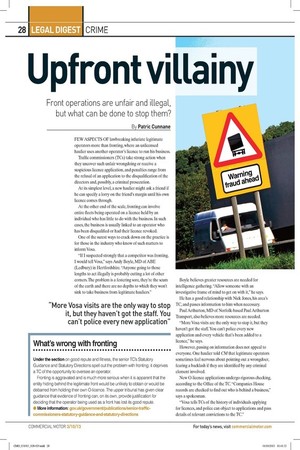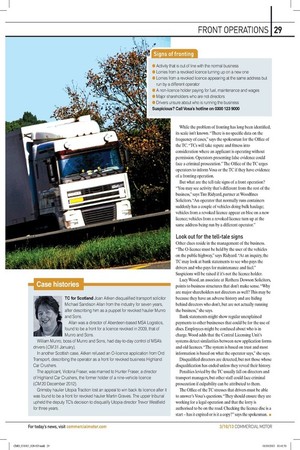Upfront villainy
Page 22

Page 23

If you've noticed an error in this article please click here to report it so we can fix it.
Front operations are unfair and illegal, but what can be done to stop them? By Patric Cunnane
FEW ASPECTS OF lawbreaking infuriate legitimate operators more than fronting, where an unlicensed haulier uses another operator's licence to run his business.
Traffic commissioners (TCs) take strong action when they uncover such unfair wrongdoing or receive a suspicious licence application, and penalties range from the refusal of an application to the disqualification of the directors and, possibly, a criminal prosecution.
At its simplest level, a new haulier might ask a friend if he can specify a lorry on the friend's margin until his own licence comes through.
At the other end of the scale, fronting can involve entire fleets being operated on a licence held by an individual who has little to do with the business. In such cases, the business is usually linked to an operator who has been disqualified or had their licence revoked.
One of the surest ways to crack down on the practice is for those in the industry who know of such matters to inform Vosa.
"If I suspected strongly that a competitor was fronting, I would tell Vosa," says Andy Boyle, MD of ABE (Ledbury) in Hertfordshire. "Anyone going to those lengths to act illegally is probably cutting a lot of other comers. The problem is a festering sore, they're the scum of the earth and there are no depths to which they won't sink to take business from legitimate hauliers." More Vosa visits are the only way to stop it, but they haven't got the staff. You can't police every new application"
Boyle believes greater resources are needed for intelligence gathering. "Allow someone with an investigative frame of mind to get on with it," he says.
He has a good relationship with Nick Jones, his area's TC, and passes information to him when necessary.
Paul Arthurton, MD of Norfolk-based Paul Arthurton Transport, also believes more resources are needed.
"More Vosa visits are the only way to stop it, but they haven't got the staff. You can't police every new application and every vehicle that's been added to a licence," he says.
However, passing on information does not appeal to everyone. One haulier told CM that legitimate operators sometimes feel nervous about pointing out a wrongdoer, fearing a backlash if they are identified by any criminal element involved.
New 0-licence applications undergo rigorous checking, according to the Office of the TC. "Companies House records are checked to find out who is behind a business," says a spokesman.
"Vosa tells TCs of the history of individuals applying for licences, and police can object to applications and pass details of relevant convictions to the TC."
While the problem of fronting has long been identified, its scale isn't known. "There is no specific data on the frequency of cases," says the spokesman for the Office of the TC."TCs will take repute and fitness into consideration where an applicant is operating without permission. Operators presenting false evidence could face a criminal prosecution." The Office of the TC urges operators to inform Vosa or the TC if they have evidence of a fronting operation.
But what are the tell-tale signs of a front operation? "You may see activity that's different from the rest of the business," says Tim Ridyard, partner at Woodfines Solicitors. "An operator that normally runs containers suddenly has a couple of vehicles doing bulk haulage; vehicles from a revoked licence appear en bloc on a new licence; vehicles from a revoked licence turn up at the same address being run by a different operator." Look out for the tell-tale signs
Other clues reside in the management of the business. "The 0-licence must be held by the user of the vehicles on the public highway," says Ridyard. "At an inquiry, the TC may look at bank statements to see who pays the drivers and who pays for maintenance and fuel." Suspicions will be raised if it's not the licence holder.
Lucy Wood, an associate at Rothera Dowson Solicitors, points to business structures that don't make sense. "Why are major shareholders not directors as well? This may be because they have an adverse history and are hiding behind directors who don't, but are not actually running the business," she says.
Bank statements might show regular unexplained payments to other businesses that could be for the use of discs. Employees might be confused about who is in charge. Wood adds that the Central Licensing Unit's systems detect similarities between new application forms and old licences. "The system is based on trust and most information is based on what the operator says," she says.
Disqualified directors are detected, but not those whose disqualification has ended unless they reveal their history.
Penalties levied by the TC usually fall on directors and transport managers, but other staff could face criminal prosecution if culpability can be attributed to them. The Office of the TC stresses that drivers must be able to answer's Vosa's questions. "They should ensure they are working for a legal operation and that the lorry is authorised to be on the road. Checking the licence disc is a start — has it expired or is it a copy?" says the spokesman. •











































